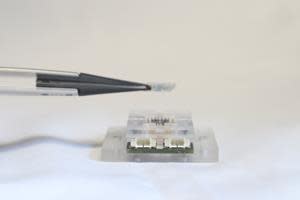Electronic control of biochip gFET sensitivity achieved

Archer's biochip in action

Highlights
Archer has advanced its biochip development by overcoming a conventional limitation preventing many biosensing platforms from becoming broadly useful.
The work builds on the significant technology development by the Company to potentially allow for the selective, complex on-chip detection of target biomolecules.
Archer has developed software and incorporated hardware with its biochip platform that addresses a fundamental phenomenon that limits gFET device sensitivity.
The biochip technology is being developed in-house by Archer staff and Archer owns 100% of the related intellectual property.
SYDNEY, Australia, March 09, 2023 (GLOBE NEWSWIRE) -- Archer Materials Limited (“Archer”, the “Company”, “ASX: AXE”) is pleased to inform shareholders that the Company has progressed the development of its biochip technology by electronically controlling the sensitivity of incorporated graphene field effect transistors (“gFET”) devices.
The Company has addressed the fundamental challenge of disrupting electronic charge screening that attenuates biosensing signals in gFETs. The development paves the way for the specific binding of biomolecules to contribute to usable gFET sensor responses, and is a significant technological milestone towards Archer’s biochip function and operation.
The screening layer is less than 1 nanometer (nm) in biologically relevant liquids, and generally, electronic sensing beyond this distance is impossible. For sensing to work in Archer’s biochip, the analyte charge must not be screened, as most biological analytes are around 2-30 nm in size, i.e., most of their charge is out of gFET sensitivity range in liquids.
Overcoming this technological challenge is a significant step in progressing towards a functional and operational biosensing device as part of Archer’s biochip technology, as it is critical for the selective detection of target molecules†.
Archer has now employed a sensor design strategy which involves the use of a range of dynamic electric fields to rid the gFET sensor of signal interference caused by the screening layer and introduce practical device operation sensitivities. Archer developed the software and incorporated the hardware with the biochip system platform that allows the Company to achieve electronic modulation and tuning of gFET sensitivity.
Measurements were performed by Archer staff in the low frequency range (1–10 Hz), which are relevant to penetrating biological fluids. Results showed a 3x increase in the sensitivity of the gFET to target analytes when compared to the static case with no oscillating voltage. In the context of overcoming charge screening in gFET devices, the 3x increase in sensitivity is significant.
Commenting on Archer’s biochip development progress, Company CEO Dr. Mohammad Choucair said: “The outcomes of Archer’s recent progress address a conventional limitation of electronic biosensors that prevents many electronic detection platforms from becoming broadly useful.
“Archer has arrived at a more sophisticated biochip platform that shows it should be feasible to design and optimise Archer’s gFET sensors to achieve the high sensitivity required for potential applications in molecular diagnostics despite the fundamental mismatch in size between biomolecules and nanoelectronic devices.”
Archer’s accelerated biochip progress and innovation
In an ASX announcement released 16 November 2022, Archer informed shareholders that the Company had implemented an early-stage prototype of an integrated biochip platform with automated liquid sample handling and electronic readout. The work was a major milestone towards Archer’s biochip technology commercialisation.
Since Archer’s biochip innovation aims to integrate gFETs into advanced fluidic systems, focus has been on building advanced and sophisticated versions of the biochip platform which could be used in commercial or applied research settings. This involves the Archer team undertaking development capable of overcoming conventional limitations of gFET sensing.
Atom-thin graphene and its application in developing Archer’s biochip
Graphene is an advanced material with electronic, chemical, and physical properties on the nanoscale that make its use in FETs for biosensing applications highly advantageous‡. Key advantages are often described as being easy operation, fast response times, real-time monitoring, high specificity and sensitivity, microfluidic integration, and multiplexing capability.
About Archer
Archer is a technology company that operates within the semiconductor industry. The Company is developing advanced semiconductor devices, including chips relevant to quantum computing and medical diagnostics.
The Board of Archer authorised this announcement to be given to ASX. | For more information about Archer’s activities, please visit our: |
|
|
† https://pubs.acs.org/doi/10.1021/acsnano.0c08622
‡ https://pubs.rsc.org/en/content/articlelanding/2021/AN/D0AN01661F
A photo accompanying this announcement is available at https://www.globenewswire.com/NewsRoom/AttachmentNg/027ec291-66c6-4653-9a87-68744397ae1c


 Yahoo Finance
Yahoo Finance 